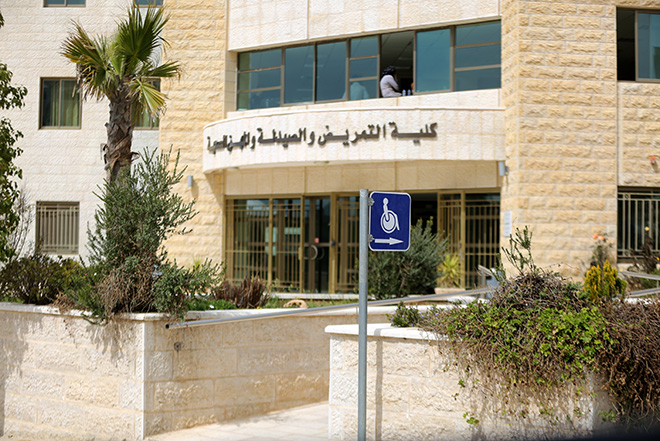Students with Special Needs Find Place at Birzeit University, Along With More Plans for Integration
Isra’, Said, and Khaled are three of the 33 college students with disabilities currently studying at Birzeit University, where they feel they have been embraced by the community despite resistance at home.
Isra’, a sophomore majoring in political science, says that students have accepted her and not made her feel out of place, easing her freshman year despite her fear and hesitation.
"My father saw that Birzeit University was the most qualified institution for students with disabilities, and so that is why I came here,” she says. “Now I feel that the university is my family and not just a seat of learning.” She seeks to become an influential person in the community, and not have to rely on others for help. Despite her positive experience on campus, Isra’ says that some buildings remain inaccessible to the physically disabled.
Said also suffers from motor impairment, but there was nothing stopping him from achieving a 99% on his matriculation exam from high school, and completing nearly three years of college, studying IT. Said believes that physical disability is not actually an impediment to life if one has a strong will. He waited one year after graduating from high school to attend university, because he lived in Hebron and found it difficult make the trip every day. He waited until he was able to live with a member of his family in Birzeit, traveling back and forth in an electric chair provided by the Birzeit University Deanship of Student Affairs.
"I don’t like to ask for help,” says Said, “although students take the initiative to help me.” The road from home to the university takes 12 minutes by chair. While he agrees with Isra’ that some of the buildings on campus remain unsuitable for those with special needs, he says “everything else on campus in terms of cooperation of students and professors encourages me to persevere and achieve my dream.”
Khaled is visually impaired, but this did not prevent him from challenging his parents and studying at Birzeit University rather than their choice of the University of Jenin, which is close to where they live. The senior political science student says that Birzeit University offers him the use of a mobile magnification device--one more advanced than the devices of his peers in France. “My great ambition is to pursue my master’s degree at Birzeit University,” he says, “and then study abroad for my doctorate and then return to teach at Birzeit University and to follow up on my scientific research."
SupportnotPity
Samia Hawamdeh, social worker at the Deanship of Student Affairs, says, "During their first semester, our disabled students face many difficulties. They need our support and not our pity, however, and we work on integrating them into the university community, especially in the voluntary work/extra-curricular activities program to make friends, as well as the singing, chess and music clubs.”
The university plans to further campus diversity by holding workshops for teachers and students on engaging with people with disabilities and means of supporting them. There are also plans to develop courses, such as in sports and computers, that suit their abilities, rather than exempting disabled students from taking them.
“What remains,” Hawamdeh adds, “is the need for additional hardware and audio educational materials, as well as someone who is specialized in Braille typing to keep up with the growing demand for Braille books.”
Birzeit University’s Disabled Students Committee was established in 2008, when the need to better represent persons with disabilities was identified and it was decided that the university’s technical capacities would be enhanced. According to committee head, Azem Assaf, who also chairs the English Department, the group moved from setting goals and plans to the stage of providing devices and tools for disabled students, each according to his/her disability. It also worked to rehabilitate university buildings for people with motor disabilities, provide a private study room in the library, equipped with tools needed by the students, and secure academic books in Braille for those with visual impairment.
Birzeit Defies Disability
Disability no longer poses an obstacle to the admission of students with disabilities, does not prevent the hiring of disabled faculty and staff, and will not prevent Khalid’s induction to the teaching staff one day. Both Isra’ and Said will also have a place in the university’s future.
These individual wishes are achievable in the near future. Twelve prospective deaf students recently came to visit the university, hoping, too, for the chance for admission. The community as a whole is working for them, and to provide them with moral and material support.







